On Sunday we playtested three more games from the #Threeforged contest: Field Work, In a Week of Sharks, and It is Forbidden. My thoughts will be brief, but my co-conspirators (Daniel Lewis Russell Benner Steve Mains) should share their opinions in the comments.
Field Work
In Field Work, you play tech workers who go out to the homes and businesses of clients and assist them with network connections, router problems, computer issues, and so forth. But here’s the kicker, and it’s an excellent one: about a year or so ago, supernatural occurrences became a regular part of life. So, for example, you might go out to repair a client’s computer, only to discover the reason it isn’t working properly is because it has been possessed by a demon. Or maybe the cable lines are down because zombie vultures have been chewing on them. In addition to dealing with mundane and/or supernatural tech issues, you also have to do debriefs with your employer, as well as a scene in which you hang out with your co-workers during lunch hour. The overall vibe is InSpectres by way of Office Space, and it is very well-realized in play.
The rules in this one are very near perfect (one or two minor quibbles, but nothing major). They got us to the outcome promised on the front of the box, and, as you may know if you listen to our podcast, that is the best compliment I can give a game. The way it works is you go out to the job (individually) and the Mundane GM (the player to your right) sets the scene and explains what’s going wrong. You engage in a little freeform RP and then roll a pair of dice, one black and one white. If the white die is higher, then the problem is a mundane one and can be solved with a mundane solution. If the black die is higher, then the Supernatural GM will explain how there is actually a supernatural issue in play. The player can then decide whether to handle it with a mundane solution or a supernatural solution. And this is where the game shines. You keep rolling dice in an attempt to solve the problem. Sometimes you solve it right away, but often the problem gets worse, or a mundane problem suddenly becomes a supernatural one. The player has a certain number of moves in which to solve the problem. If he is having a tough time, he can spend a Bond with another tech to get help from them. If he doesn’t solve the problem in time, he just leaves and heads back to base, where he will probably get chewed out a little bit during debrief.
What my explanation of the rules does not capture is how GOOD this game feels in play. The comedy level is really high, and flows pretty naturally from explanations of the die results, and the various complications that occur on the job. We were laughing and having a really great time. The rules were doing their job, but also getting out of the way enough for us to let our RP breathe. I loved it.
This game is definitely my #1 for Threeforged right now.
In a Week of Sharks
Props to these guys for the In a Wicked Age/Shark Week title joke. I got a good chuckle out of that.
You know, I have mixed feelings on this one. I don’t think I liked it as much as the rest of the table, but I still had a lot of fun. The rules work pretty well, though the game has a few odd features. The biggest one is the division of characters between Protagonist and Antagonist, and the fact that the characters are all on-sight for different reasons (or entirely different stories). It wasn’t game-breaking or anything, but it was just weird. It was unclear to me what the purpose was for dividing the characters up in this manner.
The Rock/Paper/Scissor thing (called Fin/Teeth/Tail here) was cute, I guess, but I didn’t feel like it was adding much to the proceedings. It felt a little weird that you do it before you play out the scene in order to determine how the scene will resolve. I’m curious why they didn’t go with the more typical “play out the scene to a point of conflict and then go to conflict resolution.” Again, not a game-breaker, just a design decision I couldn’t understand.
All-in-all, it was fun, but while playing it, the only thing I could think about was how fun it would be to do The Final Girl in this setting, or to re-skin Zombie Cinema for Jaws.
It is Forbidden
I had mixed feelings on this one, too. It tells a Dog Eat Dog-esque tale of two peoples, natives and newcomers. Except, in truth, it doesn’t really tell a tale at all. It is closer to the The Quiet Year in that it isn’t really a roleplaying game as much as it is an exercise designed to explore a theme. You can play the game in a more RP-focused manner, but we chose not to play it that way because 1) the rules seemed to heavily imply this was an optional style of play and 2) it looked like it would have a problem similar to Microscope, in which the RP seems disjointed and out of place.
This one has a set-up process in which you answer questions about each team’s respective people. As I have mentioned before, I love set-ups that involve answering a list of questions, because it forces you to think critically about the setting, and this one is admirable in that way. The actual gameplay is a little less interesting, being played out over three rounds in which each player describes their people taking an action, and someone from the other people explaining how they stop them from doing it and then declaring a law by saying “It is forbidden to do X because . . .” You end up with a series of laws on each side, and then have a discussion as as group about whether the two people will go to war. It works fine, but each individual scene is not particularly exciting because the outcome for each turn is pre-determined, leading to no actual tension.
In the end, there just isn’t much here. Everything works fine, but it’s all a little underwhelming. It took us less than an hour to play an entire game, but we didn’t really feel like we played a game. It felt more like a really complete set-up process for some other game. Again, nothing offensive here, and everything works ok; it just needs to be fleshed out.
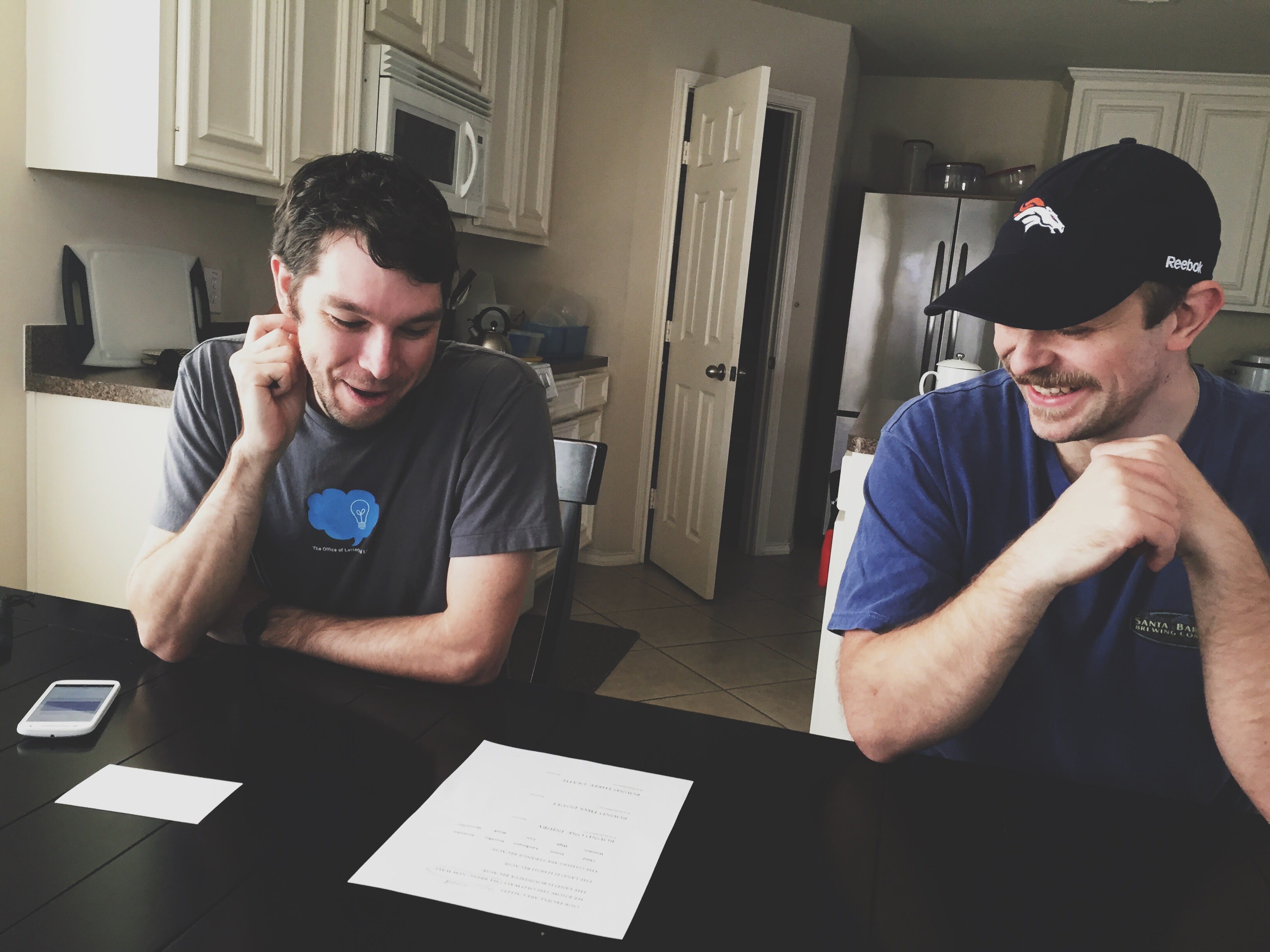
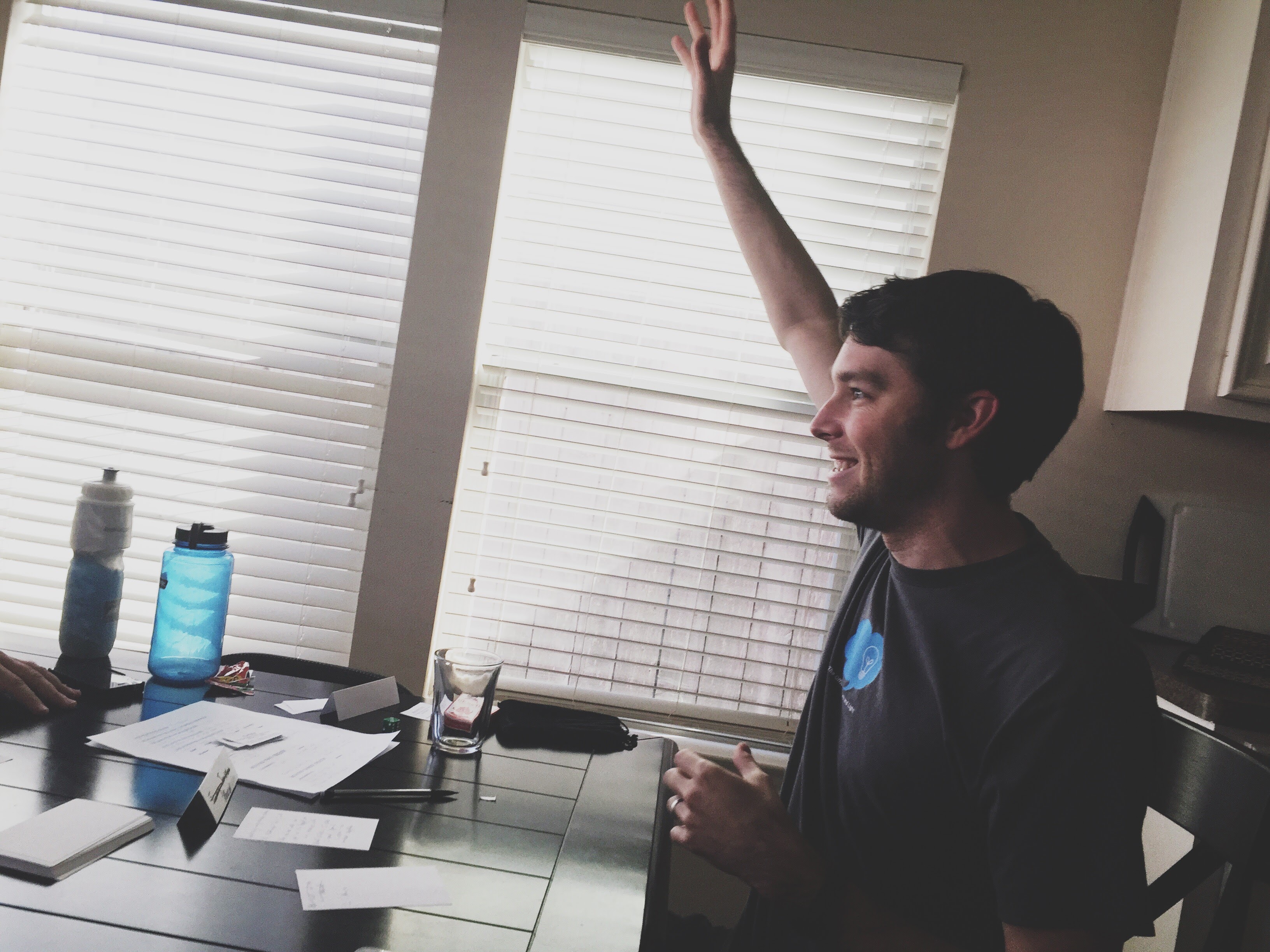
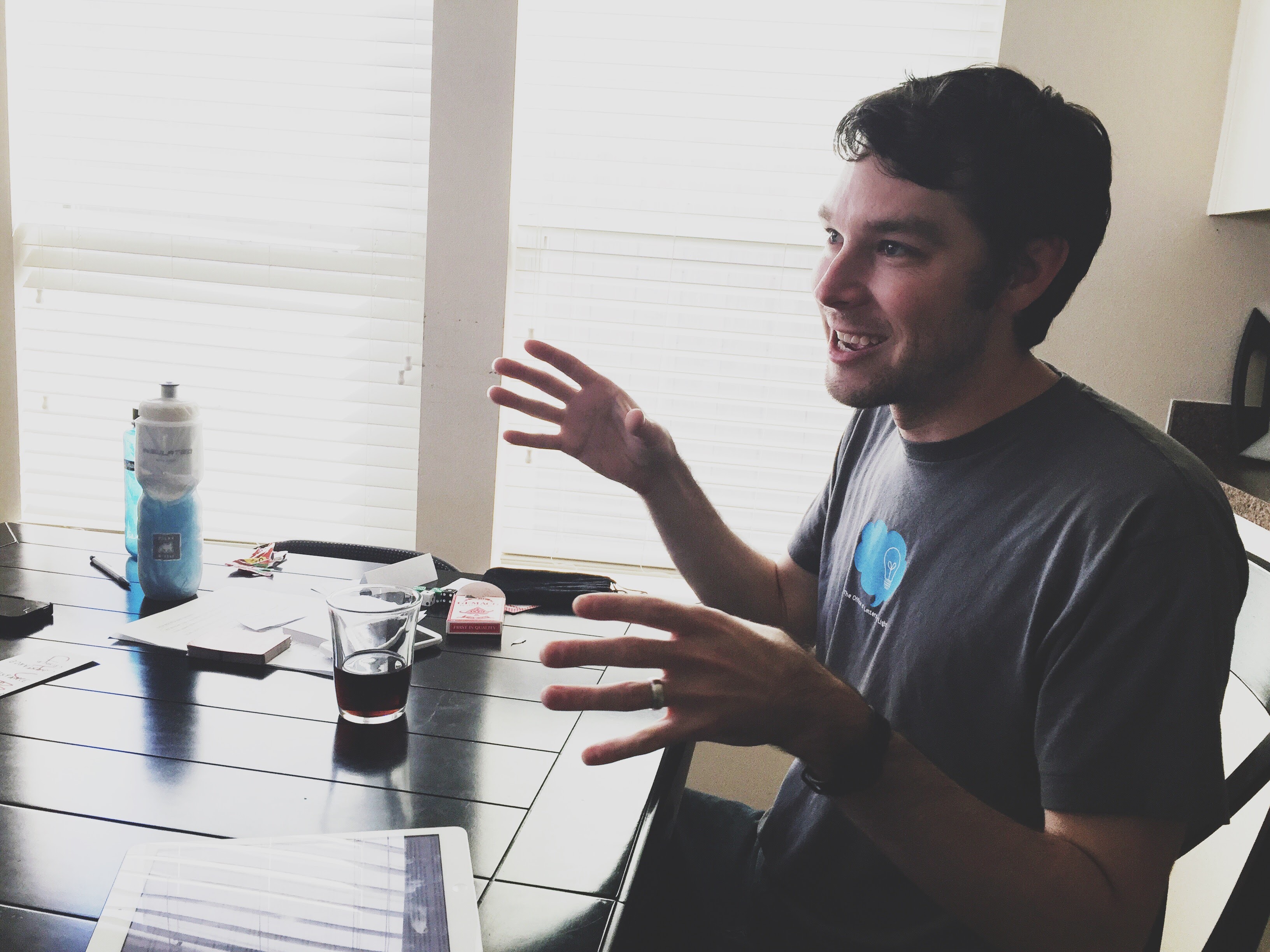
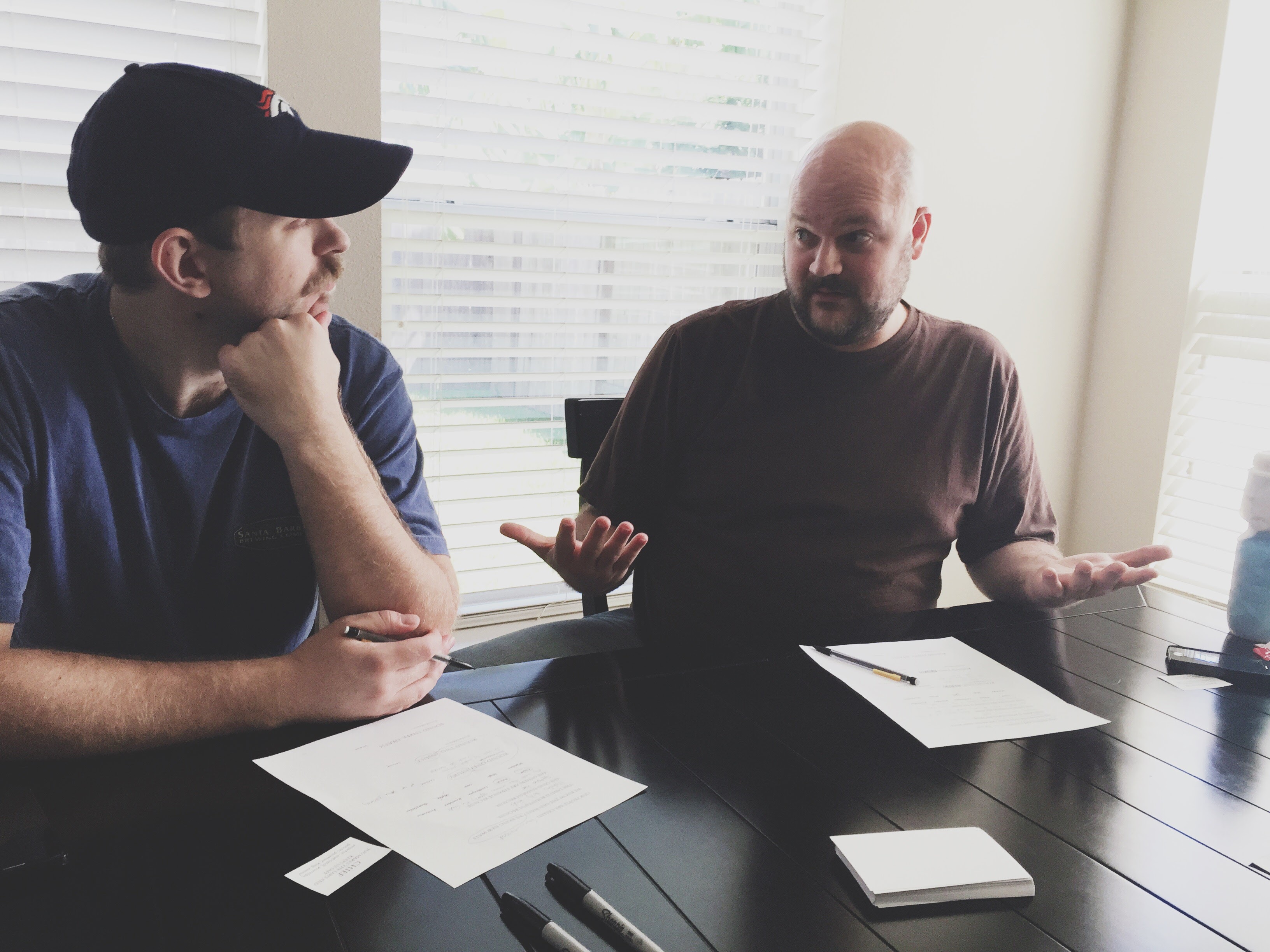
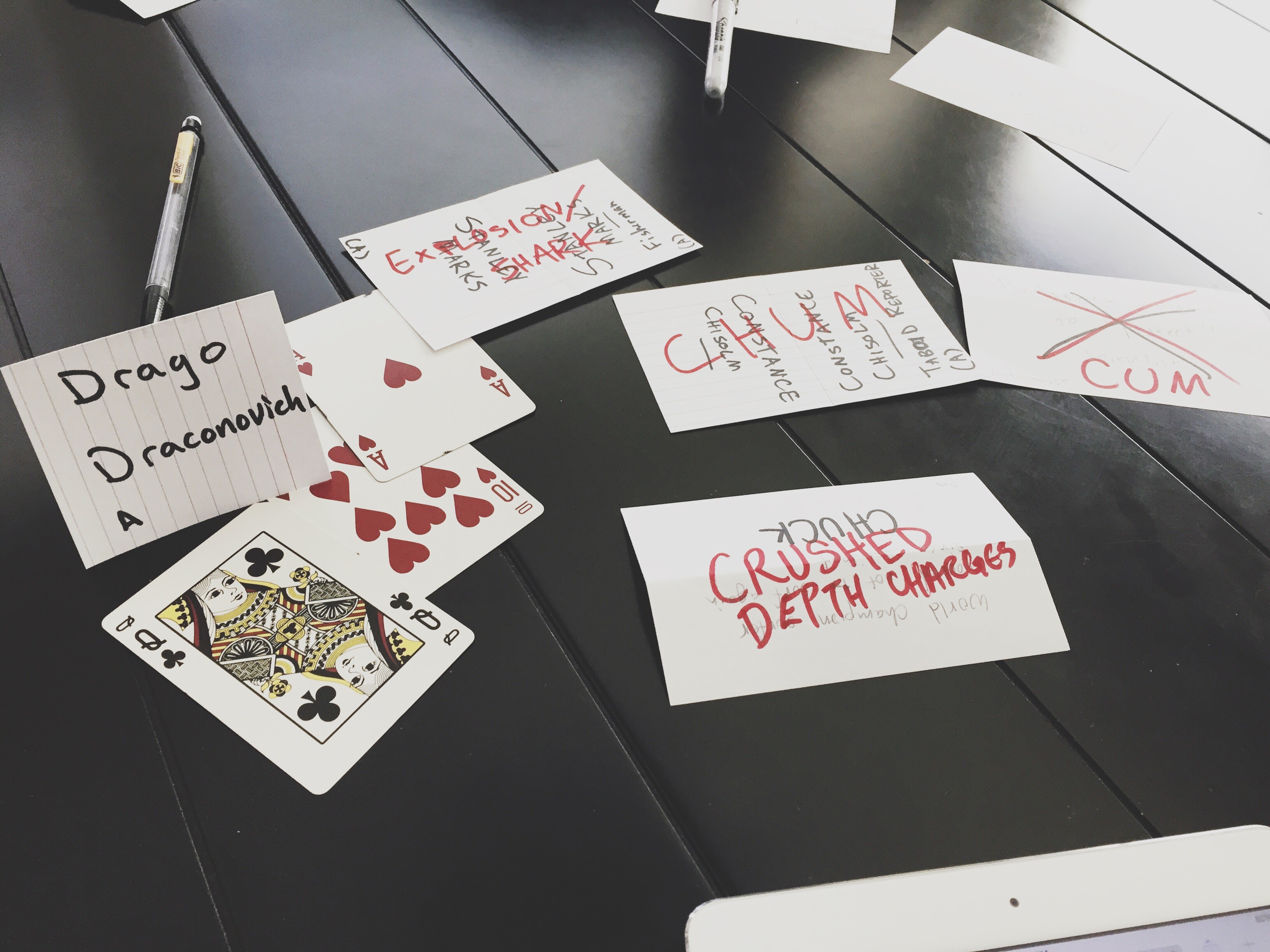

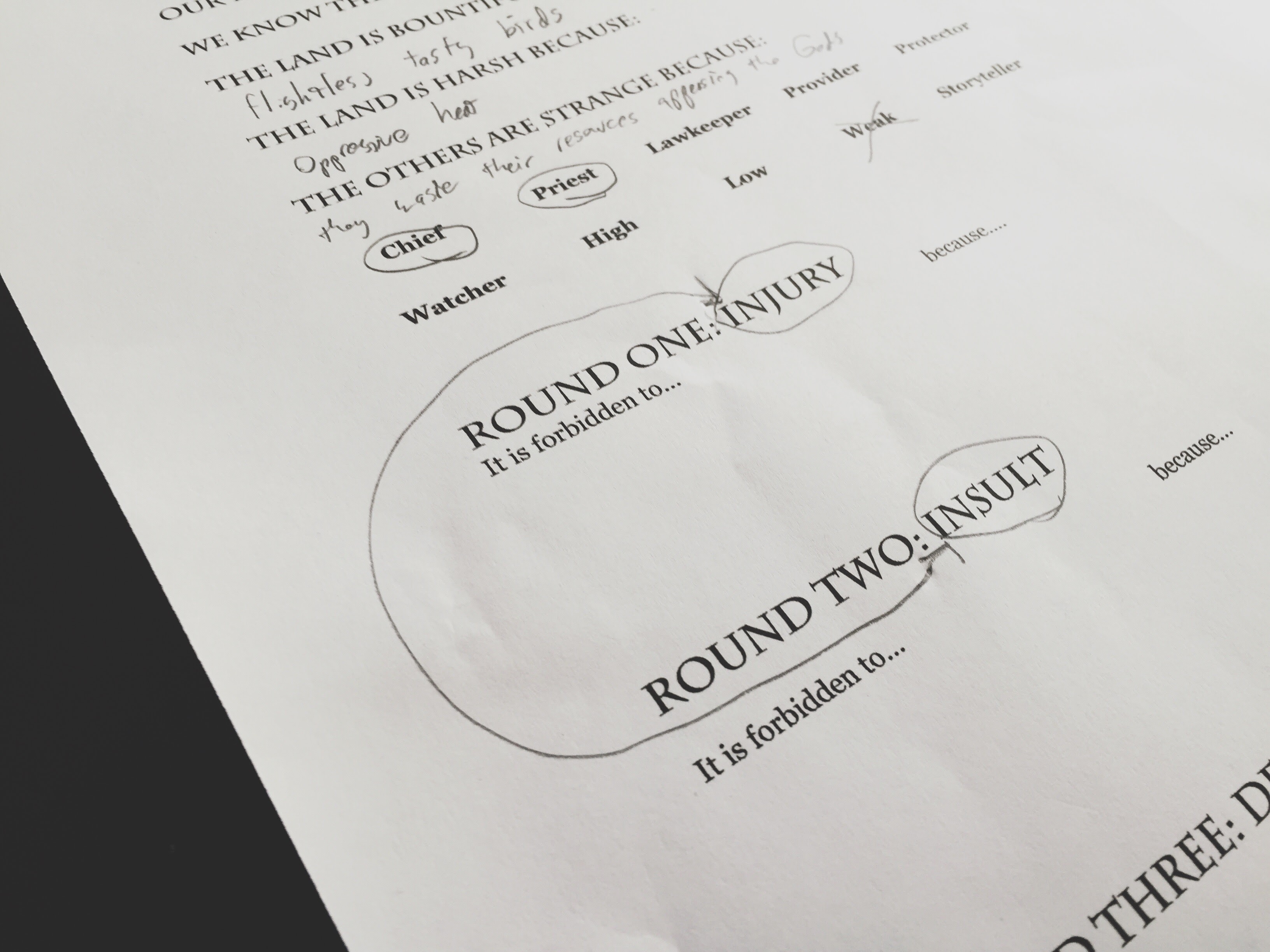

Field Work
What a surprise! I didn’t know exactly what to expect out of this one going into it. The rules could use some serious clarification and reorganization. Things are presented in a strange order and there one or two parts where it contradicts things that it stated earlier. That said, the underlying rules are simple enough that it all made sense once we started playing.
It initially seemed weird that the active player has a 50% chance of just solving the problem in a single roll, but I think it actually works, since there’s also a 50% chance that they make it worse, leading to two problems with 50% chances of getting worse and spawning new problems, etc. There’s the potential for really satisfying snowballing of failures, but if it happened every time you tried to do anything I think it might wear out its welcome before the end of the game.
Also, it’s really smart that you don’t actually have to solve all of the problems before you end the scene. You can show up, fail spectacularly, make things so much worse, and then just leave. It feels very much like how I imagine a Geek Squad tech would actually deal with things if they accidentally summoned a demon while trying to repair your router.
After every job, you have a meeting with your manager, which (as far as I could tell) has no mechanical effect, but was super satisfying to roleplay out. Having to explain to your boss how you accidentally caused a massive supernatural catastrophe was never not fun.
In general, I loved everything about this game. It’s definitely at the top of my list as well.
Field Work
What a surprise! I didn’t know exactly what to expect out of this one going into it. The rules could use some serious clarification and reorganization. Things are presented in a strange order and there one or two parts where it contradicts things that it stated earlier. That said, the underlying rules are simple enough that it all made sense once we started playing.
It initially seemed weird that the active player has a 50% chance of just solving the problem in a single roll, but I think it actually works, since there’s also a 50% chance that they make it worse, leading to two problems with 50% chances of getting worse and spawning new problems, etc. There’s the potential for really satisfying snowballing of failures, but if it happened every time you tried to do anything I think it might wear out its welcome before the end of the game.
Also, it’s really smart that you don’t actually have to solve all of the problems before you end the scene. You can show up, fail spectacularly, make things so much worse, and then just leave. It feels very much like how I imagine a Geek Squad tech would actually deal with things if they accidentally summoned a demon while trying to repair your router.
After every job, you have a meeting with your manager, which (as far as I could tell) has no mechanical effect, but was super satisfying to roleplay out. Having to explain to your boss how you accidentally caused a massive supernatural catastrophe was never not fun.
In general, I loved everything about this game. It’s definitely at the top of my list as well.
In A Week Of Sharks
I have mixed feeling about this one. I had a lot of fun playing it, but I was playing Vescor, the shark, so my experience probably reflects less on the game itself and more on the fact that it’s fun as hell to pretend to be a shark and eat people.
I agree that the initial setup seems weird. You use all of these story seeds to create protagonists and antagonists and then pick one to play, but each person ends up with one of the characters from their own little story prompt, who then has to have all of their conflicts (at least initially) with people from other, unrelated, story prompts? I don’t know, I wasn’t paying too much attention at that point, honestly, I was mostly fantasizing about how Vescor, the “ultimate predator conceived of by man or nature”, was going to murder all of them. I didn’t give a shit about their petty squabbles. I was going to eat them all indiscriminately. And I did. And it was rad.
My favorite moment was (probably) a result of a rules oversight by the designers. In one of my scenes as Vescor, I got a Teeth, Fin, Tail result which said I needed a crucial item to achieve my goal (which was, of course, eating some poor sap). I don’t know if that was supposed to apply to Vescor or not, but that was the moment when Vescor learned to use explosives, which he continued to use to great effect for the rest of the game, often inexplicably setting them in places sharks had no business being able to go.
So yeah, I had fun, but I think I might have had more fun than the rest of the table combined.
In A Week Of Sharks
I have mixed feeling about this one. I had a lot of fun playing it, but I was playing Vescor, the shark, so my experience probably reflects less on the game itself and more on the fact that it’s fun as hell to pretend to be a shark and eat people.
I agree that the initial setup seems weird. You use all of these story seeds to create protagonists and antagonists and then pick one to play, but each person ends up with one of the characters from their own little story prompt, who then has to have all of their conflicts (at least initially) with people from other, unrelated, story prompts? I don’t know, I wasn’t paying too much attention at that point, honestly, I was mostly fantasizing about how Vescor, the “ultimate predator conceived of by man or nature”, was going to murder all of them. I didn’t give a shit about their petty squabbles. I was going to eat them all indiscriminately. And I did. And it was rad.
My favorite moment was (probably) a result of a rules oversight by the designers. In one of my scenes as Vescor, I got a Teeth, Fin, Tail result which said I needed a crucial item to achieve my goal (which was, of course, eating some poor sap). I don’t know if that was supposed to apply to Vescor or not, but that was the moment when Vescor learned to use explosives, which he continued to use to great effect for the rest of the game, often inexplicably setting them in places sharks had no business being able to go.
So yeah, I had fun, but I think I might have had more fun than the rest of the table combined.
It Is Forbidden
This was a weird one. I wanted to play it specifically because it did a lot of things that I thought sounded strange. I like the idea of learning about these two societies by watching them fail to co-exist peacefully and it’s neat to learn of the laws by seeing their response when others break them.
In practice, it plays real weird. Like Jason said, we didn’t really do much in the way of in-character roleplaying, because it didn’t seem particularly appropriate, despite the fact that we presumably each controlled a single character. I guess we could have spent more time fleshing out our characters and playing out the scenes, but when you know that all your character will do is fail three time to try to accomplish things, exactly who they are doesn’t feel important.
The initial society creation was neat. I really like that each society has to say why they find the others strange. This is a fantastic setup question, because not only does it let you define facts about your rival society, but it also indirectly defines things about your own society. It’s a very clever touch.
One strange thing we found was that the laws that we were creating got less interesting as the game went on. Initially, you are dealing with situations where the stakes are relatively low. These are where the interesting differences between the two societies really came into focus. Here we got laws that gave us insight into each society’s religious beliefs and social structures. Once we made it to the later stages, where the stakes are injury or death, all of our law became pretty generic though. Lots of “It’s forbidden to kill us” and “it’s forbidden to steal our food”. It just seemed like the scope of possible conflicts with really high stakes limited us to pretty obvious laws.
So in general, super interesting concept, but I’m not sold on it in its current form.
It Is Forbidden
This was a weird one. I wanted to play it specifically because it did a lot of things that I thought sounded strange. I like the idea of learning about these two societies by watching them fail to co-exist peacefully and it’s neat to learn of the laws by seeing their response when others break them.
In practice, it plays real weird. Like Jason said, we didn’t really do much in the way of in-character roleplaying, because it didn’t seem particularly appropriate, despite the fact that we presumably each controlled a single character. I guess we could have spent more time fleshing out our characters and playing out the scenes, but when you know that all your character will do is fail three time to try to accomplish things, exactly who they are doesn’t feel important.
The initial society creation was neat. I really like that each society has to say why they find the others strange. This is a fantastic setup question, because not only does it let you define facts about your rival society, but it also indirectly defines things about your own society. It’s a very clever touch.
One strange thing we found was that the laws that we were creating got less interesting as the game went on. Initially, you are dealing with situations where the stakes are relatively low. These are where the interesting differences between the two societies really came into focus. Here we got laws that gave us insight into each society’s religious beliefs and social structures. Once we made it to the later stages, where the stakes are injury or death, all of our law became pretty generic though. Lots of “It’s forbidden to kill us” and “it’s forbidden to steal our food”. It just seemed like the scope of possible conflicts with really high stakes limited us to pretty obvious laws.
So in general, super interesting concept, but I’m not sold on it in its current form.
Field Work is not ambitious in the way that, say, Timelines is, but it delivers a fast, fun experience. The dice rolling functions not as task or conflict resolution, really, but as the randomized equivalent of here’s a white die or here’s a black die in Fiasco, plus an excuse to add complications. I think our doing debrief scenes after each job rather than at the end of the day was us misunderstanding that part of the rules, but I liked it.
The game needs some clarity in the rules. Which GM does what and when, who plays which NPCs, and so on. And a more extensive example of play would be good. But it delivers: we had a lot of fun in the way the game intended.
In A Week of Sharks is largely functional, but feels like it takes ideas from better games and uses them in a less effective manner. Character creation is basically the oracles from In A Wicked Age, but more complicated and with additional hiccups. It results in a pool of characters like The Final Girl, but you only play one at a time, and don’t really get to know any of them.
Each player picks an oracle from three possibilities, and writes down the pro- and antagonists it mentions. Then everyone picks characters that they’ll play until they die, basically. Unless the shark-GM does their best to fiat someone alive, which would be really lame, every chosen character is pretty likely to not make it. This means the characters we get to know even a little bit are doomed, and we won’t give a shit about the survivors.
There’s a weirder problem with the pro/antagonist character creation. The first character I chose to play was an antagonist who, naturally, died very quickly. This left us with two related characters who were only defined in relation to a dead character they hadn’t interacted with yet. Very awkward. With death going the way it does in this game, anything hinted at in the oracles is pretty unlikely to really rear its head. Again: unsatisfying.
Field Work is not ambitious in the way that, say, Timelines is, but it delivers a fast, fun experience. The dice rolling functions not as task or conflict resolution, really, but as the randomized equivalent of here’s a white die or here’s a black die in Fiasco, plus an excuse to add complications. I think our doing debrief scenes after each job rather than at the end of the day was us misunderstanding that part of the rules, but I liked it.
The game needs some clarity in the rules. Which GM does what and when, who plays which NPCs, and so on. And a more extensive example of play would be good. But it delivers: we had a lot of fun in the way the game intended.
In A Week of Sharks is largely functional, but feels like it takes ideas from better games and uses them in a less effective manner. Character creation is basically the oracles from In A Wicked Age, but more complicated and with additional hiccups. It results in a pool of characters like The Final Girl, but you only play one at a time, and don’t really get to know any of them.
Each player picks an oracle from three possibilities, and writes down the pro- and antagonists it mentions. Then everyone picks characters that they’ll play until they die, basically. Unless the shark-GM does their best to fiat someone alive, which would be really lame, every chosen character is pretty likely to not make it. This means the characters we get to know even a little bit are doomed, and we won’t give a shit about the survivors.
There’s a weirder problem with the pro/antagonist character creation. The first character I chose to play was an antagonist who, naturally, died very quickly. This left us with two related characters who were only defined in relation to a dead character they hadn’t interacted with yet. Very awkward. With death going the way it does in this game, anything hinted at in the oracles is pretty unlikely to really rear its head. Again: unsatisfying.
In A Week if Sharks addendum: Jaws, The Game is a pretty solid idea for an rpg, and with some playtesting and revision this one could make for a really fun one-shot.
Others have said what I wanted to say about It Is Forbidden, for the most part. It was weird to feel like we didn’t miss much by opting not to roleplay through the scenes. Kind of a bummer.
In A Week if Sharks addendum: Jaws, The Game is a pretty solid idea for an rpg, and with some playtesting and revision this one could make for a really fun one-shot.
Others have said what I wanted to say about It Is Forbidden, for the most part. It was weird to feel like we didn’t miss much by opting not to roleplay through the scenes. Kind of a bummer.
Steve Mains Re: “I think our doing debrief scenes after each job rather than at the end of the day was us misunderstanding that part of the rules, but I liked it.”
It just depends on which part of the rules you want to go by. One part says to debrief after every job, another part says the debriefs are only at the end of the day. Debriefing after every job seems like the way to go though, since otherwise the Company GM doesn’t have a whole lot to do.
Steve Mains Re: “I think our doing debrief scenes after each job rather than at the end of the day was us misunderstanding that part of the rules, but I liked it.”
It just depends on which part of the rules you want to go by. One part says to debrief after every job, another part says the debriefs are only at the end of the day. Debriefing after every job seems like the way to go though, since otherwise the Company GM doesn’t have a whole lot to do.
Ah, OK. That part was fun.
Ah, OK. That part was fun.
I’m so glad Field Work worked. I quite liked it.
Daniel Lewis – There’s the potential for really satisfying snowballing of failures, but if it happened every time you tried to do anything I think it might wear out its welcome before the end of the game.
Did that wearing out its welcome happen or could you just see it was possible / certain?
I’m so glad Field Work worked. I quite liked it.
Daniel Lewis – There’s the potential for really satisfying snowballing of failures, but if it happened every time you tried to do anything I think it might wear out its welcome before the end of the game.
Did that wearing out its welcome happen or could you just see it was possible / certain?
No, it didn’t happen to us. Out of the 8 jobs we ran, we probably completed half of them in a single roll and I think only 2 went so bad that we left them uncompleted. Having about two total catastrophes felt like the right amount.
No, it didn’t happen to us. Out of the 8 jobs we ran, we probably completed half of them in a single roll and I think only 2 went so bad that we left them uncompleted. Having about two total catastrophes felt like the right amount.
Daniel Lewis Robert Bohl I would add that the mix of simple, mundane jobs and supernatural jobs contributed positively the game’s vibe. Even with the simple jobs, there was some fun RP, including the debrief.
Daniel Lewis Robert Bohl I would add that the mix of simple, mundane jobs and supernatural jobs contributed positively the game’s vibe. Even with the simple jobs, there was some fun RP, including the debrief.
Hmm, Field Work sounds like it might actually be interesting to play, but being an SME on its premise I’m sure I’d find fault with it.
Hmm, Field Work sounds like it might actually be interesting to play, but being an SME on its premise I’m sure I’d find fault with it.
Kerry Harrison Haha, maybe.
Kerry Harrison Haha, maybe.
It is super cool to see some actual play going on! Interesting to see how this write up varies from reviews I’ve seen. (Though admittedly I have not read all the reviews because NOBODY CAN READ THAT MANY REVIEWS.)
It is super cool to see some actual play going on! Interesting to see how this write up varies from reviews I’ve seen. (Though admittedly I have not read all the reviews because NOBODY CAN READ THAT MANY REVIEWS.)
I’m so glad that my intuition re: Field Work was correct. Whew. Did not really have a certain feel for Forbidden, so thanks for the perspective.
I’m so glad that my intuition re: Field Work was correct. Whew. Did not really have a certain feel for Forbidden, so thanks for the perspective.